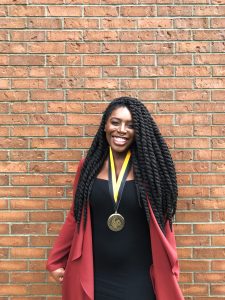
History graduate student Porsha Dossie was awarded UCF’s Order of the Pegasus, which is the first time a History student has received the universities most prestigious recognition.
The Order of the Pegasus award recognizes students for their exemplary performance at both the graduate and undergraduate level. Undergraduates who are selected for the university’s most significant award are chosen based on their academic achievement, outstanding university involvement, leadership and community service. Master’s degree students, doctoral and M.D. students who are selected are recognized for their publication and research experiences in addition to the same attributes of undergraduate candidates.
Dossie is one of three humanities students who were inducted into Order of the Pegasus at both the graduate and undergraduate levels.
“My research is something that they really appreciated, and I think that helped me the most,” said Dossie. “I was trying to find a way to make what I do as an emerging historian accessible and making people understand that the work I do is impactful and also necessary. It was great that it was received very well and that they saw the value in what I was doing.”
Dossie, who has been advised by Dr. Connie Lester and Dr. Yovanna Pineda, became heavily involved in research during the last two years of her undergraduate career. Her work during that time involved looking at how derogatory visions of black womanhood was used to market free and enslaved black women to white men before and after the Civil War. While serving as a member of UCF’s Student Undergraduate Research Council, Dossie was able to see just how impactful her work was to young black women.
While serving as a member of UCF’s Student Undergraduate Research Council, Dossie presented her work to a room filled with female students from Jones’ High School, a predominantly black high school near downtown Orlando. After the presentation, the Jones’ students shared that even though their school served a predominantly black population, black history wasn’t something they got much of.

“My work really meant a lot to them,” said Dossie. “Just hearing this history was something that made them say ‘I want to take history classes here at UCF, if I apply,’ and a lot of them actually did apply.”
As a graduate student, Dossie’s research now focuses on the Miami uprising that took place in the 1980’s. While this work concentrates on events that took place more recently, Dossie says it’s just as important.
“I think with the heightened awareness of Black Lives Matter and of police brutality, the topic that I’m focusing on has a lot of contemporary parallels,” said Dossie. “Sometimes, people can’t connect. But I think I’m trying to make that connection accessible for people to show that history can also effect change and social policy.”
Long term, Dossie sees herself helping to make history available to audiences by being at the forefront of creating visually engaging museum exhibitions and materials. Historically, museums have been places that were antithetical to social justice. As museums begin to reflect the populations they serve, there’s a pressing need to diversify the voices of their decision makers to include narratives that aren’t heteronormative.
“I want to challenge the museums I work at to be inclusive and to open their doors to more competing viewpoints,” said Dossie.
Currently, Dossie is interning at the National Park Service in D.C. and is also working on the thesis for her Master’s degree with every intention to pursue her doctorate. While setbacks and failure have been part of her journey, she’s convinced that putting herself out there was the best thing she could have done.
“Don’t be afraid to put yourself out there because you don’t know what could happen,” said Dossie. “It takes one ‘yes’ to open a lot of doors.”
Dossie’s current internship with the National Park Service is coming to a close, but she was recently asked to return and will begin a second internship during the fall.